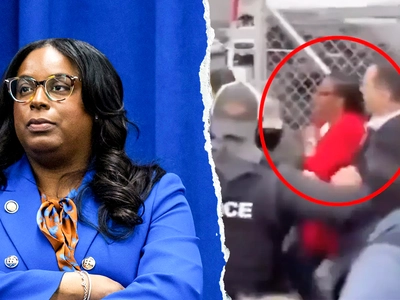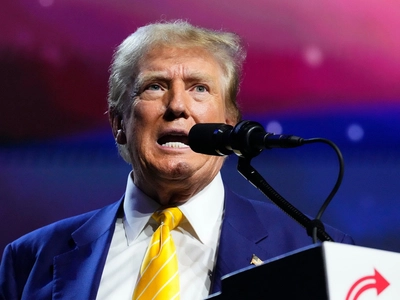McIver Assaults ICE Agent: How This Political Clash Unveils Power Struggles and Accountability Crisis
The halls of Congress have seen their fair share of controversy, but few incidents have sparked as much debate about accountability and political theater as the recent federal charges against Rep. LaMonica McIver. The New Jersey Democrat now faces the political fight of her career after being indicted on three federal counts for allegedly assaulting ICE officers during what was supposed to be routine congressional oversight.
What started as a planned inspection of the Delaney Hall Federal Immigration Facility in Newark has morphed into a national flashpoint that exposes the dangerous intersection of political posturing and law enforcement. The question isn't just what happened that day in May—it's what this incident reveals about the state of American politics and whether anyone is truly above the law.
The Day Everything Went Wrong
Picture this: A sitting member of Congress, wearing the badge of federal authority, allegedly physically interfering with federal officers as they attempt to arrest Newark Mayor Ras Baraka. The scene outside the ICE detention facility wasn't just chaotic—it was a perfect storm of political grandstanding gone catastrophically wrong.
According to federal prosecutors, McIver didn't just witness the arrest of Mayor Baraka; she actively "forcibly impeded and interfered with federal officers" as they performed their duties. This wasn't a case of peaceful protest or legitimate congressional oversight. This was, prosecutors argue, a sitting congresswoman physically obstructing justice.
The irony is staggering. McIver, who sits on the House Homeland Security Committee—the very committee that oversees the agencies she allegedly assaulted—found herself on the wrong side of the law she helps write. The optics couldn't be worse for Democrats who have spent years preaching about the rule of law and holding officials accountable.
Republicans Strike Back: The Censure Campaign
The GOP response was swift and merciless. House Republicans didn't just express disappointment—they launched a full-scale political offensive designed to make McIver an example of Democratic hypocrisy. Rep. Nancy Mace of South Carolina went nuclear, filing a resolution not just to censure McIver, but to expel her from Congress entirely.
The censure resolution, which will force a House-wide vote, aims to achieve two devastating outcomes for McIver: public humiliation through official condemnation and removal from her coveted Homeland Security Committee seat. It's political warfare disguised as accountability, and Republicans are betting that Democrats will struggle to defend a colleague facing federal assault charges.
"This resolution aims to kick me off the committee that presides over the Department of Homeland Security and shame me for doing the oversight work that is my job," McIver fired back, painting herself as a victim of Republican overreach rather than acknowledging the serious nature of federal assault charges.
The Double Standard Dilemma
Here's where the story gets truly explosive: Democrats find themselves trapped in a web of their own making. For years, they've demanded accountability from Republicans, calling for resignations and expulsions over far lesser infractions. Now, faced with one of their own facing federal assault charges, they're circling the wagons and crying political persecution.
The contrast is stark. When Republicans face ethics issues, Democrats are quick to demand consequences. But when McIver pleads not guilty to federal charges while remaining on a committee that oversees the very agencies she allegedly assaulted, Democratic leadership promises to "respond vigorously"—not to her alleged misconduct, but to Republican efforts at accountability.
This isn't just hypocrisy—it's a dangerous precedent that suggests political party membership trumps the rule of law. If a sitting congresswoman can allegedly assault federal officers and retain her position on the committee overseeing those same agencies, what message does that send about accountability in America?
The Broader Picture: When Politics Becomes Performance Art
The McIver incident is symptomatic of a larger disease in American politics: the transformation of governance into performance art. Congressional "oversight" visits have become stages for political theater, where elected officials play to cameras rather than conduct serious business.
What happened at that ICE facility wasn't oversight—it was a made-for-media moment that spiraled out of control. The fact that multiple members of Congress, accompanied by cameras and supporters, descended on a federal facility speaks to the performative nature of modern politics. Real oversight happens in committee rooms and through official channels, not in staged confrontations with federal agents.
The incident also highlights the dangerous militarization of political discourse. When congressional oversight becomes confrontational, when elected officials allegedly engage in physical altercations with law enforcement, we've crossed a line from politics into something far more dangerous.
The Stakes Couldn't Be Higher
As McIver prepares for her legal battle while simultaneously fighting to keep her committee seat, the implications extend far beyond one congresswoman's career. This case will determine whether federal law applies equally to elected officials or whether political position provides immunity from consequences.
The House vote on McIver's censure will be more than just parliamentary procedure—it will be a referendum on accountability in the age of political polarization. Democrats face a choice: stand by a colleague facing federal assault charges or demonstrate that the rule of law transcends party politics.
Meanwhile, Republicans see an opportunity to expose what they view as Democratic hypocrisy while scoring political points. The cynical calculation is obvious: use McIver's alleged misconduct to paint all Democrats as lawless extremists who put politics above public safety.
The Accountability Reckoning
Regardless of the political maneuvering, the core question remains: Should elected officials be held to a higher standard, or do they get special treatment when facing serious criminal charges? McIver's case forces us to confront uncomfortable truths about power, privilege, and accountability in American politics.
The federal charges against McIver aren't political rhetoric or partisan attacks—they're allegations from career prosecutors who believe they have evidence of criminal conduct. If these charges were against a private citizen, there would be no debate about consequences. But because McIver wears the title "Congresswoman," suddenly the rules seem negotiable.
This isn't about Republican versus Democrat—it's about whether we still believe that no one is above the law. The outcome of McIver's legal and political battles will send a clear message about whether accountability exists in American politics or whether it's just another casualty of our polarized times.
The American people deserve better than elected officials who allegedly assault federal agents during publicity stunts masquerading as oversight. They deserve representatives who understand that with great power comes great responsibility, not greater immunity from consequences. The McIver case isn't just about one congresswoman's alleged misconduct—it's about the soul of American democracy and whether accountability still means anything in the halls of power.




